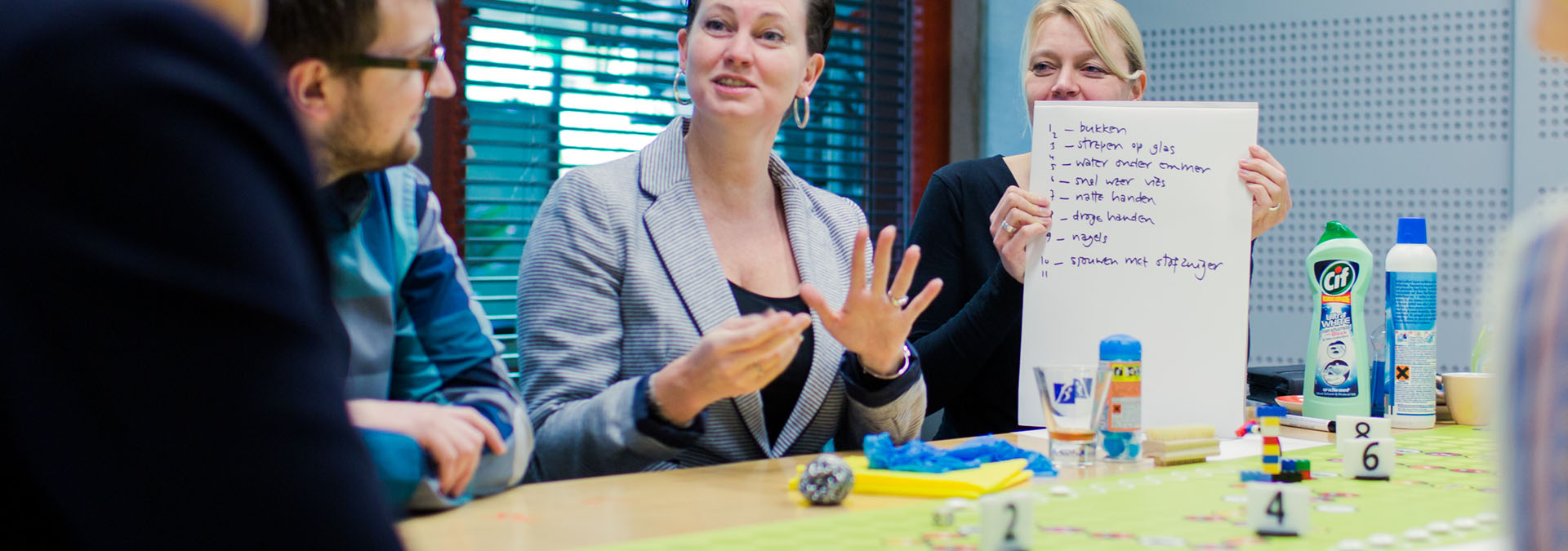




Design Game® is an innovative research tool that unites designers with end-users to analyze products or services and create relevant new insights and ideas as possible platforms for innovation.
Design Game is a co-creation tool with the format of a board game. The game is played with consumers and other relevant stakeholders. Using the social environment of a game situation, the tool is highly efficient in both quality and quantity of output.
In the first half of the game the participants work in two teams answering questions that offer insights into their attitudes, behavior, challenges and issues. In the second part they are set tasks that focus on the development of solutions for the issues and challenges identified in the first part of the game.
Design Game produces detailed consumer insights and ideas for new or improved products and services. These results are presented in an insight-based report using the words, drawings and sketches made during the game (each team is assisted by a designer who is able to visualize their ideas).
This co-creation research tool is best used in the earlier stages of the innovation process when it is important to generate concepts based on real issues and challenges using real end-users and stakeholders.
Design Game is a co-creation tool with the format of a board game. The game is played with consumers and other relevant stakeholders. Using the social environment of a game situation, the tool is highly efficient in both quality and quantity of output.
In the first half of the game the participants work in two teams answering questions that offer insights into their attitudes, behavior, challenges and issues. In the second part they are set tasks that focus on the development of solutions for the issues and challenges identified in the first part of the game.
Design Game produces detailed consumer insights and ideas for new or improved products and services. These results are presented in an insight-based report using the words, drawings and sketches made during the game (each team is assisted by a designer who is able to visualize their ideas).
This co-creation research tool is best used in the earlier stages of the innovation process when it is important to generate concepts based on real issues and challenges using real end-users and stakeholders.
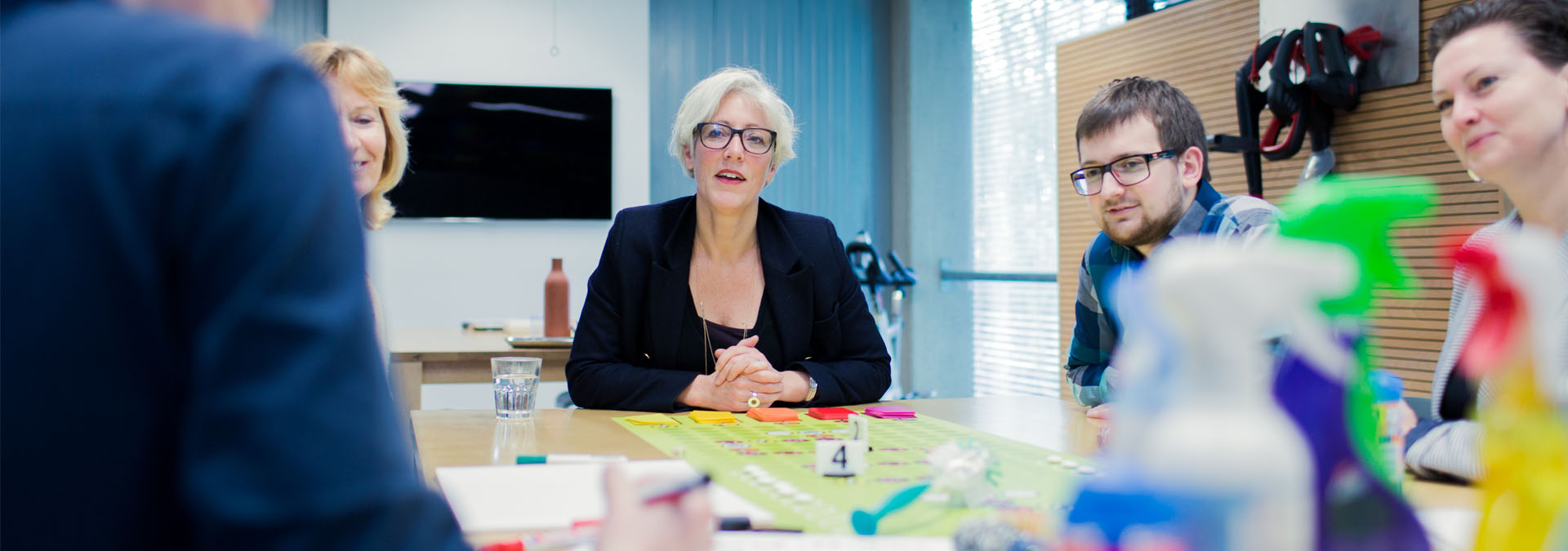
Any organization involved in developing new products, packaging and services will benefit from using Design Game. Suppliers of FMCG’s, consumer durables and industrial machines as well as services have all used it with great success.
For example, Design Game proved to be essential in developing: a new fruit drink proposition for Hero, new packaging for Lego, a range of kitchen tools for Brabantia and space saving pans for Tefal, among many others. Please see some examples of Design Game cases below.
Any organization involved in developing new products, packaging and services will benefit from using Design Game. Suppliers of FMCG’s, consumer durables and industrial machines as well as services have all used it with great success.
For example, Design Game proved to be essential in developing: a new fruit drink proposition for Hero, new packaging for Lego, a range of kitchen tools for Brabantia and space saving pans for Tefal, among many others. Please see some examples of Design Game cases below.

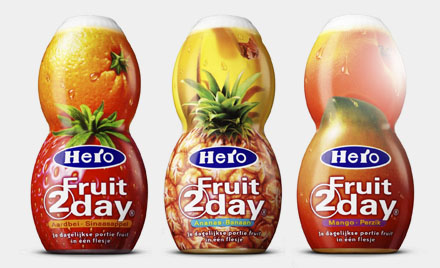
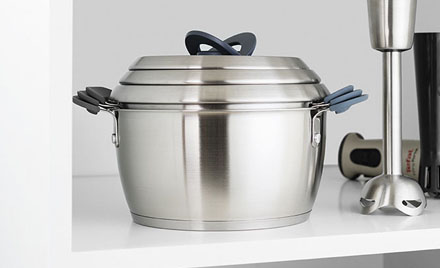
For Hero the research objective was to find new product propositions for a recent R&D effort; a juice with chewable pieces of fruit in it. One of the fundamental insights the Design Game uncovered was that a ‘chewy fruit drink’ is much closer to the healthy experience of eating fresh fruit than normal juices. The co-creation aspect of the Design Game, supported the development of a new iconic packaging that immediately communicates what the product stands for: 2 pieces of fruit a day! Bringing Hero an international business success of up to 350 million annually sold worldwide.
For Tefal we researched new storage/organization innovation opportunities for their US market. Playing the games in New York, where kitchen space is limited. Resulting in a range of ingenious solutions: space-saving pans with versatile removable handles, stackable lids and matching accessories.

For Hero the research objective was to find new product propositions for a recent R&D effort; a juice with chewable pieces of fruit in it. One of the fundamental insights the Design Game uncovered was that a ‘chewy fruit drink’ is much closer to the healthy experience of eating fresh fruit than normal juices. The co-creation aspect of the Design Game, supported the development of a new iconic packaging that immediately communicates what the product stands for: 2 pieces of fruit a day! Bringing Hero an international business success of up to 350 million annually sold worldwide.

For Tefal we researched new storage/organization innovation opportunities for their US market. Playing the games in New York, where kitchen space is limited. Resulting in a range of ingenious solutions: space-saving pans with versatile removable handles, stackable lids and matching accessories.
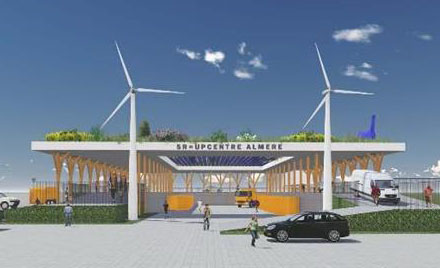
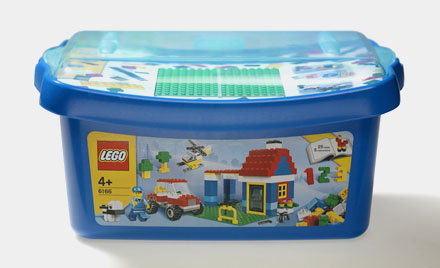
The city of Almere has the ambition to become the world’s first waste-free city! In order to do so the waste that is produced should not be treated as waste but as a resource for new products. In order to makethis happen a transformation is needed in the way waste is collected, stored, seperated, recycled and re-valuated. The Design Game enabled us to discover the main drivers for each stakeholder: the garbage man, the local entrepreneur, the city government and of course the citizens themselves. The insights have been translated into a long term strategy which is being rolled out and well underway.
LEGO starter-kits have at least three stakeholders: the children playing with LEGO or DUPLO, parents concerned with educating their kids and gift-givers like grandparents. Playing the Design Game uncovered all the crucial insights in the main drivers of each group of stakeholders. This enabled us to develop a powerful innovation platform for the starter-kits: spark imagination starting in the retail outlet, demonstrate the unique playing possibilities of LEGO, and help to clean up afterwards. We developed the boxes that were crucial in positioning LEGO (= play well) in its core values again and recently created the new version.

The city of Almere has the ambition to become the world’s first waste-free city! In order to do so the waste that is produced should not be treated as waste but as a resource for new products. In order to makethis happen a transformation is needed in the way waste is collected, stored, seperated, recycled and re-valuated. The Design Game enabled us to discover the main drivers for each stakeholder: the garbage man, the local entrepreneur, the city government and of course the citizens themselves. The insights have been translated into a long term strategy which is being rolled out and well underway.

LEGO starter-kits have at least three stakeholders: the children playing with LEGO or DUPLO, parents concerned with educating their kids and gift-givers like grandparents. Playing the Design Game uncovered all the crucial insights in the main drivers of each group of stakeholders. This enabled us to develop a powerful innovation platform for the starter-kits: spark imagination starting in the retail outlet, demonstrate the unique playing possibilities of LEGO, and help to clean up afterwards. We developed the boxes that were crucial in positioning LEGO (= play well) in its core values again and recently created the new version.
Are you curious how Design Game can help innovate your business? Don’t hesitate to contact Jeroen.
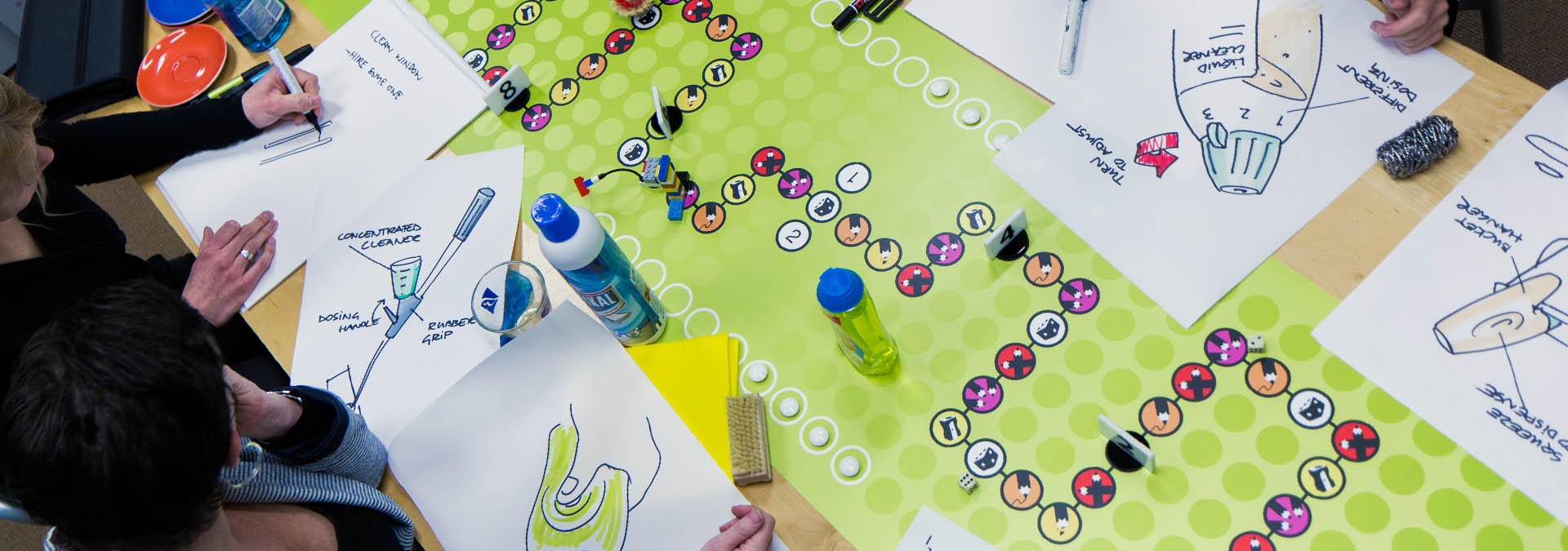
We developed Design Game back in 2002, because we feel that in order to innovate successfully, a profound understanding of end-users’ needs is essential. Involvement of consumers and other stakeholders at this early stage in the innovation process enlarges the final innovation success.
The method of Design Game allows for interaction between end-users, stakeholders, our clients and designers. We believe this interaction is very valuable as it enables both designers as well as our clients to obtain direct consumer insights. Based on these insights, platforms for more successful strategic product development can be build.
Design Game is a joint venture between FLEX/design and Blauw Research. It is exclusively available from FLEX and Blauw Research. Blauw Research is a market research agency with offices in the UK, Netherlands and Germany. They are a full service agency offering qualitative and quantitative research services.
FLEX/design is an industrial design, product development and structural packaging agency that strives to create a new reality: for clients, for people and for society. FLEX offers a wide range of innovation services for the design, engineering, prototyping and manufacturing of new packaging, products and services.
We developed Design Game back in 2002, because we feel that in order to innovate successfully, a profound understanding of end-users’ needs is essential. Involvement of consumers and other stakeholders at this early stage in the innovation process enlarges the final innovation success.
The method of Design Game allows for interaction between end-users, stakeholders, our clients and designers. We believe this interaction is very valuable as it enables both designers as well as our clients to obtain direct consumer insights. Based on these insights, platforms for more successful strategic product development can be build.
Design Game is a joint venture between FLEX/design and Blauw Research. It is exclusively available from FLEX and Blauw Research. Blauw Research is a market research agency with offices in the UK, Netherlands and Germany. They are a full service agency offering qualitative and quantitative research services.
FLEX/design is an industrial design, product development and structural packaging agency that strives to create a new reality: for clients, for people and for society. FLEX offers a wide range of innovation services for the design, engineering, prototyping and manufacturing of new packaging, products and services.
